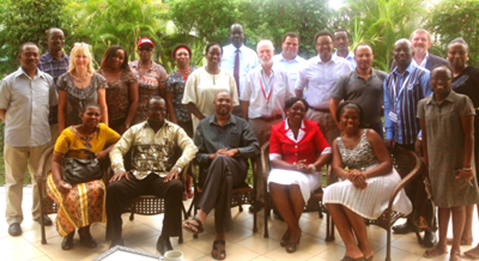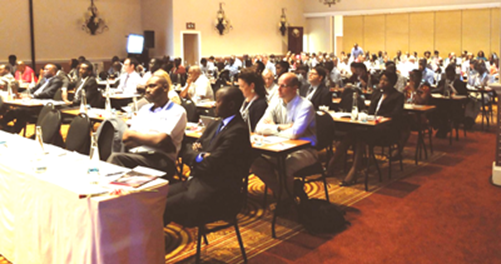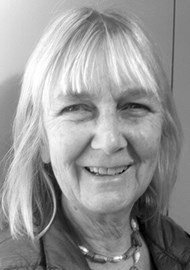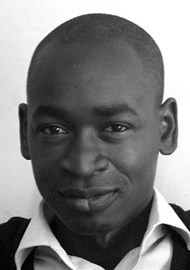The VISION 2020 LINK [1] between the College of Ophthalmology of Eastern, Central and Southern Africa (COECSA) and the Royal College of Ophthalmologists (RCOphth) has been building leaders of eye care in Africa since 2008, when a Memorandum of Understanding was signed by the CEO of the then Eastern African College of Ophthalmologists (EACO), Sheila Mugo, and the RCOphth President, Brenda Billington [2].
Since then, EACO has grown in size and stature, merging with the Ophthalmological Society of Eastern Africa (OSEA) and becoming the College of Ophthalmology of Eastern, Central and Southern Africa (COECSA) [3], covering eight countries (Kenya, Uganda, Tanzania, Rwanda, Burundi, Malawi, Ethiopia and Zambia). South Sudan, Zimbabwe and Mozambique have also applied for membership and are likely to be admitted soon. COECSA has also expanded to embrace mid-level eye workers as well as ophthalmologists.
The intention of the LINK has always been to help COECSA realise its full potential to co-ordinate high quality training in the region and oversee the highest standards of practice. With the second COECSA Scientific Conference having taken place in Livingstone, Zambia in late 2014, this is a good time to review progress of the College-to-College VISION 2020 LINK.

Participants in the COECSA curriculum meeting, Zambia 2014.
The areas in which the RCOphth has supported the development of COECSA were identified during the VISION 2020 LINKS Needs Assessment process in 2007:
- Establish EACO as a regionally and internationally recognised organisation that coordinates, enables capacity building and ensures quality in ophthalmology in the region.
- Develop and administer an EACO fellowship programme that is recognised regionally and internationally.
- Improve the quality of training for ophthalmologists in the region.
- Increase the number of ophthalmologists trained in each member institution.
- Increase the quality and volume of research publications in ophthalmology within the region.
- Strengthen the network for comprehensive eye care with Ministries of Health and Ministries of Education (MOH/MOE) and other partners to meet the needs in the region.
- Develop a sustainable organisation framework for the institutional development of EACO.
Within these overall areas, the RCOphth has shared its considerable expertise and contributed in several ways:
- Planning the COECSA fellowship exam, training examiners and assisting with delivery of a high quality exam
- Developing a harmonised, on-line curriculum for ophthalmologists’ training
- Training the Trainers
- Helping develop relevant guidelines for target diseases
- Exchange continuing professional development (CPD) visits to the RCOphth Congress and the COECSA Conference, for shared learning
- Leadership training and mentoring for young ophthalmologists
The COECSA fellowship exam
The COECSA fellowship exam has gone from strength to strength over the four years it has been held. It is taken by ophthalmologists in addition to their own training institution Master of Medicine (MMed) degree. In 2014 it was held in Blantyre, Malawi. Twenty candidates took the exam and 13 passed.
The fellowship exam has attracted an increasing number of candidates each year, thanks to the leadership shown by Millicent Kariuki and her successor Muchai Gachago. There is a growing pool of trained examiners who have benefitted from RCOphth examiner training, led by Carrie MacEwen, Emily Beet and George Hibdige, which has taken place each year before the exam.
The experience of David Kasongole, Ophthalmologist in Mongu district, Zambia, is testament to the success of the COECSA fellowship exam:
“It took me time to decide whether I should sit the fellowship exam in 2014, having already established myself as an Honorary Fellow of ICO. Besides, I left my classroom in Nairobi four years earlier. Nonetheless, with encouragement from colleagues and inspiration from my former classmate who pioneered the fellowship in 2010, I took up the challenge. I found the whole experience to be exciting, coming face-to-face with former lecturers and colleagues who have become examiners. The fact that the RCOphth has walked with COECSA and added external exam observers encourages more candidates to take the exam. This fellowship is of a world standard and ought to be pushed to greater heights; the sky is not the limit! Having successfully taken the fellowship I am now more motivated in my work and enjoy being part of the large COECSA family. Furthermore, I now reckon that I am ready to go for my dream – subspecialty training abroad – as my mind is refreshed and ready to receive more knowledge.”
Development of an on-line curriculum
The RCOphth on-line curriculum [4] has provided the blueprint for COECSA to develop its own curriculum relevant for Eastern, Central and Southern Africa. The curriculum has 10 domains and 138 learning outcomes, which will be assessed by workplace-based assessments. However, the pressure of time, lack of educational supervisors and different MMed courses in each of the universities across the eight countries makes this exercise complicated and challenging. The College Training Chair Fiona Spencer, Susannah Grant and Fiona Bishop have worked closely with COECSA to progress this work, which will come to fruition early in 2015.
COECSA has also been working with training institutions and Ministry of Health officials (National Eye Care Coordinators) across the region to harmonise both the MMed and mid-level training curricula. COECSA is increasingly seen as a unifying force and the custodian of academic and professional standards in the region.
Moving forward, COECSA will begin to evaluate and accredit training programmes, review the MMed and mid-level curricula and provide an end of training exam or recommendation of the graduates to the national regulatory authority in ophthalmology in the region.
Anna Sanyiwa, Ophthalmologist at MUHAS, Tanzania, who leads the COECSA curriculum committee, said:
“The process has brought together COECSA countries and introduced harmony across the regional training institutions. We have confidence that the products of our training universities are of the same quality. As it is a competency-based programme, which it was not before, the quality of ophthalmology graduates is improving. The assessment is going to be much more objective. We are all learning through the process and as we are the people who have made it, we have ownership and want to use it.”
Training the Trainers (TTT)
Two successful courses have been run by Melanie Corbett and Train the Trainer faculty members from the RCOphth, the most recent being in Nairobi in November 2014.
Three COECSA participants from the 2013 course were invited back to join the faculty for the 2014 course. They each selected a topic to deliver as a lecture, with an associated practical session. They were provided with slides to amend as they wished, and a video of a RCOphth faculty member giving the same lecture. Afterwards they received feedback from all the participants and practical advice to aid their future development.
Feedback showed that the participants found the experience exciting and challenging, and they felt they benefitted from a huge learning experience. The course extended their thinking because it “highlighted areas for development for both trainer and trainee” and covered “new processes that they had not experienced as students.”
The three COECSA faculty members felt that, although they had learnt a lot from the two TTT courses they had attended, it was too early for them to be entrusted with running the course themselves. They would need “more than one exposure to the course” as a facilitator, and the support of a “forum to pass on the learning.” They would then feel more comfortable “facilitating in their own region” before leading an international course.
Exchange CPD visits and development of the COECSA Scientific Conference
Last year, nine COECSA delegates from eight countries attended the RCOphth Congress in Birmingham. The visit was a great success and the delegates benefitted from participating in a well-run and scientifically excellent meeting. Examples of improvements to practice pledged by the COECSA participants following the Congress were:
- avoiding medical errors as much as possible
- comprehensive management of patients from history-taking to treatment
- gonioscopy for all glaucoma patients
- auditing clinical work
Consity Mwale, who led the organisation of the 2014 COECSA Conference in Livingstone, Zambia, directly applied the learning from attendance at the RCOphth Congress and set up three committees to oversee organisation, planning and management. These were: a finance committee for planning, budgeting and reporting to the Zambia Ophthalmological Society leadership; an administrative committee for participant communication and information; and a scientific committee for the programme, scientific content and communication with the Zambian Ministry of Health. The scientific committee also awarded participants with CPD points and certificates.
Levi Kandeke, Ophthalmologist in Burundi, who came to the RCOphth Congress in 2013, said:
“If you are by yourself in a small country like Burundi you are isolated and you can go downhill. Coming to the RCOphth Congress gave me confidence and credit when I got back home. I was more interested to read more and wanted to teach the young ones and tell them what I had experienced.”
Leadership and mentoring
The College-to-College LINK has actively addressed the need to enhance leadership and mentoring in the region. It worked with the COECSA Young Ophthalmologists Forum to hold a two-day leadership course in February 2014, facilitated by Clare Inkster, Consultant Ophthalmologist in Bolton and Amy Brockbank, Psychologist and Mentoring Scheme Lead, North West Deanery. They said: “The participants demonstrated evidence of improved leadership skills through working in teams in theoretical and practical exercises, as well as producing comprehensive country development plans.”
Future plans
The importance of leadership development in African health systems is highlighted in a recent statement from Margaret Mungherera, immediate past president of the World Medical Association:
“The main reason for Africa’s weak healthcare systems is neither a shortage of policies, nor road maps, nor even funding. Lack of leadership capacity, reflected in corruption and flawed policy implementation, must be addressed.”
Both COECSA and the RCOphth plan for the LINK to continue, so they can build on the achievements of the past six years. Having benefitted from support from the Health Partnerships Scheme, managed by Tropical Health & Education Trust (THET) and funded by the Department for International Development, further funding is needed for mid-2015 onwards.
The LINK plans to concentrate on the areas where progress has been made but needs to be sustained: leadership, examinations, curriculum, Training the Trainers and sharing learning through attendance at the RCOphth and COECSA congresses.
The key outcome is for COECSA to have the capacity and ability to independently fulfill all the functions of a College itself, but maintain a sustainable LINK partnership with the RCOphth to ensure continuing quality through ongoing assessment, support and collaboration.
The VISION 2020 LINKS Programme relies entirely on grants and donations from non-government organisations (NGOs), companies and individuals. Major support for the Programme and for the LINKS is received from Christian Blind Mission (CBM), Department for International Development (DFID) via THET, Scottish Government, Standard Chartered Bank, the EyeBag Company and the Beatrice Laing Trust. We are hugely grateful to our donors and partners for their support. To enable the College-to-College LINK to continue, funds are needed. The VISION 2020 LINKS Programme has a ‘JustGiving’ site, making individual giving easy [5]. Innovative ideas for engaging the support of more companies and organisations such as Rotary would be particularly welcome. For more information please contact the VISION 2020 LINKS Programme [1].

Participants in the COECSA Conference in Livingstone, Zambia, 2014.
Reflections on the College-to-College LINK from COECSA:
“Almost everything COECSA does is down to the RCOphth holding our hand and guiding us – before we do anything we ask – has RCOphth done this and who is there in RCOphth who can help us? RCOphth has been our role model in so many things,”
Grace Mwangi, COECSA Programme Officer.
“RCOphth has held our hand from the outset in guiding us in harmonising residency and specialisation programmes. They have been key in curriculum development across various institutions who are then drawn into this network. The fellowship exams are well advanced in the region, thanks to RCOphth enabling the trainers. There is a great desire to have a continued partnership.”
Ibrahim Matende, COECSA President.
Nyawira Mwangi, in her 2014 research dissertation for the MSc in Public Health for Eye Care at the International Centre for Eye Health, London School of Hygiene & Tropical Medicine, carried out an independent review and situational analysis of the COECSA-RCOphth VISION 2020 LINK with the title ‘International collaboration in eye care education’.
She concluded that the VISION 2020 LINK is an active, evolving and genuine link that does not just exist on paper; has led to human resource capacity building in low resource settings and is a key theme in health system strengthening.
She pointed out some areas in which further collaboration would be beneficial, for example joint research projects, subspecialty training within the region, training for the editorial team of the COECSA scientific journal, mobilisation of resources and appropriate technology, and sourcing equipment for eye care. She also concluded that the existing VISION 2020 LINKS that involve COECSA institutions are synergistic with the college-to-college LINK.
References
1. VISION 2020 LINKS programme. International Centre for Eye Health.
http://iceh.lshtm.ac.uk/
vision-2020-links-programme/
Last accessed February 2015.
2. Astbury N, Zondervan M, Walker C. VISION 2020 LINKS Programme: raising standards in Eastern, Central and Southern Africa. Eye News 2013;20(1):46-8.
3. College of Ophthalmology of Eastern, Central and Southern Africa.
www.coecsa.org
Last accessed February 2015.
4. Curriculum for Ophthalmic Specialist Training. The Royal College of Ophthalmologists.
http://curriculum.rcophth.ac.uk/
Last accessed February 2015.
5. VISION 2020 LINKS Programme. Just Giving.
https://www.justgiving.com/v2020-links/
Last accessed February 2015.

COMMENTS ARE WELCOME








